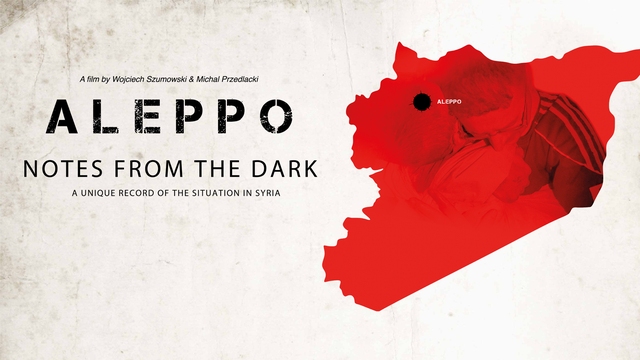The dead lie among the rubble, the streets alive with crossfire. The scenes are familiar, but the actors, unknown. What the media don't show is that these snipers, grenade-slingers, and rifle-waving freedom fighters all have former lives - selling vegetables, repairing refrigerators, and trading women's clothing. From the tragic to the mundane, this powerful doc gives Aleppians space to tell their own stories. A unique record of the life of a city.
"God willing, after the uprising I'm going back to my old job", says Mohammad Sayed, a journalist working for the Aleppo Media Centre.
"I used to repair mobile phones. Journalism is my duty, but it is not my profession." His life, like everyone living here, has been on hold for the last two years. He now documents the horror that has become their new day-to-day.
"I saw a severed hand with moving fingers", he recalls of the aftermath of one of Aleppo's daily explosions.
"I saw half a man crying out."
Many former protesters have taken up arms against Bashar al-Assad's mercenary forces, but even those without weapons must fight for survival. Tanks prowl the ruins of the city's ancient squares, and snipers line the rooftops.
"They will sometimes bet a glass of tea or a cigarette - 'Can you shoot that woman or not?'", explains Abu Ahmed, a rebel unit commander. Their cruel games make simply crossing the street a nightmarish gauntlet. But people still try. It's the only way to get food, and thousands are on the verge of starvation.
"Life here is slow dying. You die a thousand times a day around here."
Tucked away in basements and alleyways, unsung benefactors do their best to bring help to the most needy. Imam Qasim delivers alms to the poorest suburbs, while Abu Mahiya bakes bread for free. Solidarity, and a consummate faith, is all they have left.
"I'm willing to accept Mujahideen, Alawis, Druzc, Christians and others", declares Abu Obaida, an FSA combatant.
"But only those who love our land, and whose actions are guided by humanity."
This remarkable tapestry of tales records the lives of seven ordinary citizens living in extraordinary circumstances, as they talk openly about the darkness of despair, and the dream of its ending.
"I don't have any dreams. I don't. I wish my dad could live in peace, that's all."
LEARN MORE.
WATCH MORE.
JOIN THE DISCUSSION.

Winner - Special Award BZ WBK, HumanDOC International Documentary Film Festival 2014, Poland

Winner - Grand Prix for Best Film, HumanDOC International Documentary Film Festival 2014, Poland

Winner - Audience Award, WATCH DOCS 2014

Official Selection, Festival delle Storie, 2014

Official Selection, Festival des Libertes 2014

Official selection, Prague One World Film Festival 2014

Official Selection, Polish Film Festival in America, 2014
 The dead lie among the rubble, the streets alive with crossfire. The scenes are familiar, but the actors, unknown. What the media don't show is that these snipers, grenade-slingers, and rifle-waving freedom fighters all have former lives - selling vegetables, repairing refrigerators, and trading women's clothing. From the tragic to the mundane, this powerful doc gives Aleppians space to tell their own stories. A unique record of the life of a city.
The dead lie among the rubble, the streets alive with crossfire. The scenes are familiar, but the actors, unknown. What the media don't show is that these snipers, grenade-slingers, and rifle-waving freedom fighters all have former lives - selling vegetables, repairing refrigerators, and trading women's clothing. From the tragic to the mundane, this powerful doc gives Aleppians space to tell their own stories. A unique record of the life of a city.
 Winner - Special Award BZ WBK, HumanDOC International Documentary Film Festival 2014, Poland
Winner - Special Award BZ WBK, HumanDOC International Documentary Film Festival 2014, Poland
 Winner - Grand Prix for Best Film, HumanDOC International Documentary Film Festival 2014, Poland
Winner - Grand Prix for Best Film, HumanDOC International Documentary Film Festival 2014, Poland
 Winner - Audience Award, WATCH DOCS 2014
Winner - Audience Award, WATCH DOCS 2014
 Official Selection, Festival delle Storie, 2014
Official Selection, Festival delle Storie, 2014
 Official Selection, Festival des Libertes 2014
Official Selection, Festival des Libertes 2014
 Official selection, Prague One World Film Festival 2014
Official selection, Prague One World Film Festival 2014
 Official Selection, Polish Film Festival in America, 2014
Official Selection, Polish Film Festival in America, 2014







